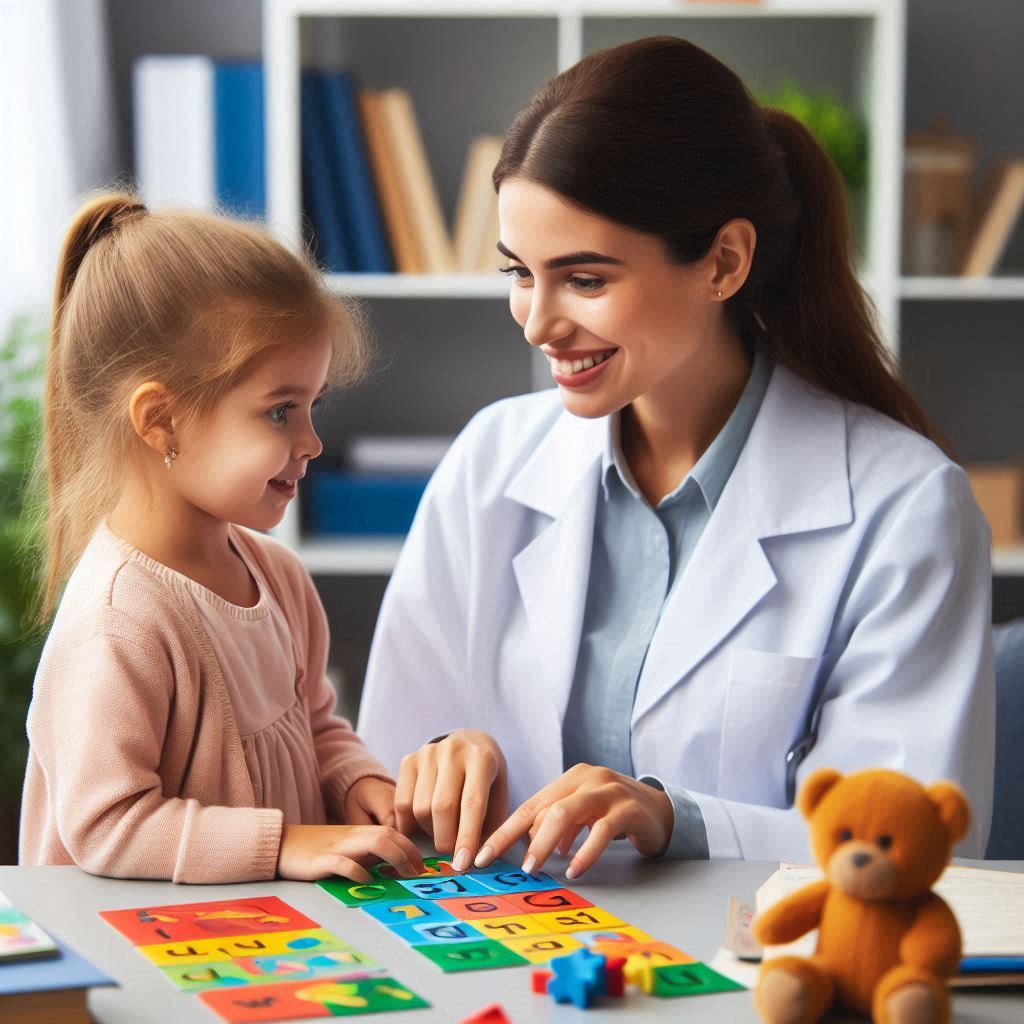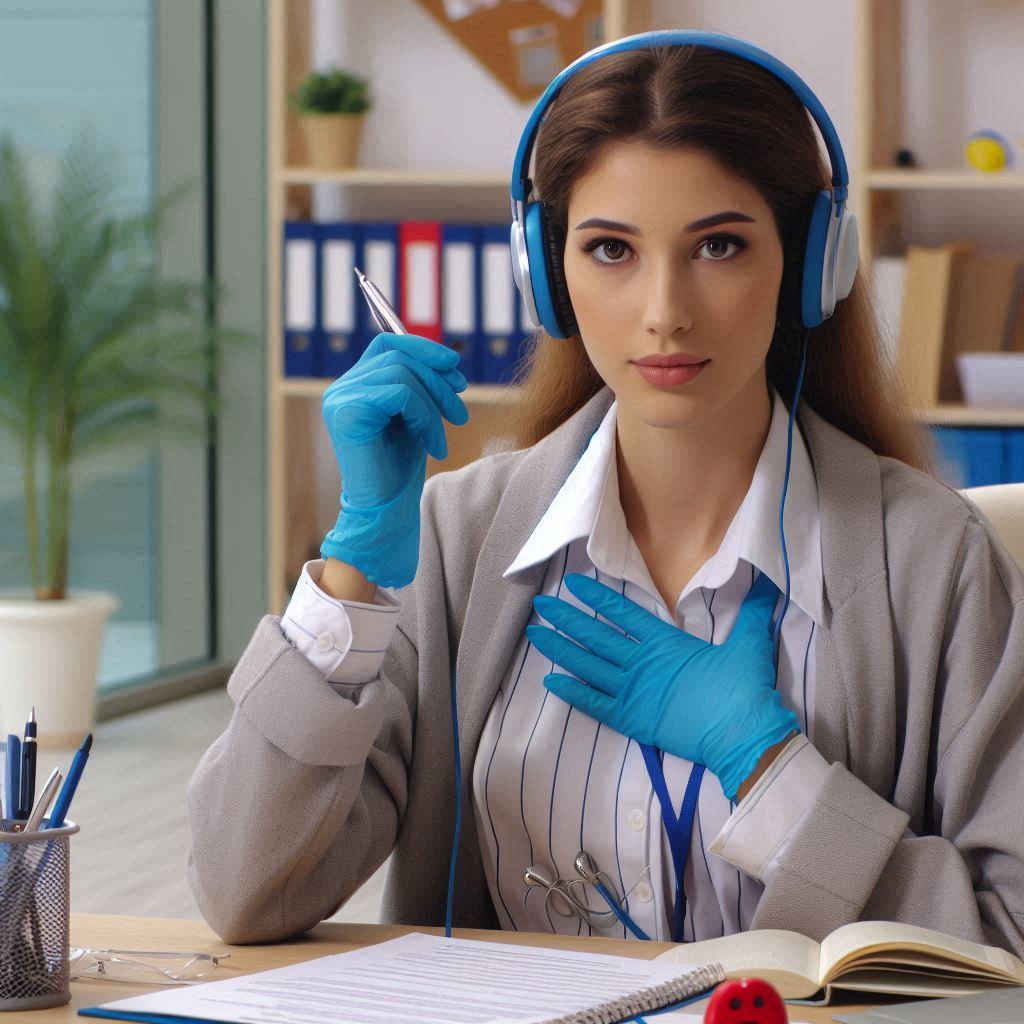Introduction
Speech-Language Pathologists (SLPs) are professionals who assess and treat speech and language disorders.
They are crucial in school settings, where they support students struggling with communication skills. SLPs work directly with children to improve their speech, language, and social communication abilities.
They develop individualized plans tailored to each student’s unique needs. SLPs collaborate with teachers to integrate speech and language goals into classroom activities.
By working closely with parents, SLPs ensure consistent support at home and school. Early intervention by SLPs can prevent more severe issues from developing.
They play a vital role in helping students succeed academically and socially. SLPs empower students to express themselves confidently and effectively.
Their work fosters a positive learning environment for all students. SLPs provide essential services that enhance overall educational outcomes.
They address and overcome communication barriers, making learning accessible for everyone.
SLPs’ contributions are invaluable in creating inclusive and supportive school communities. Their expertise ensures that all students have the opportunity to thrive.
Education and Training of SLPs
Speech-Language Pathologists (SLPs) play a critical role in schools, helping students overcome speech and language challenges that may impact their academic success. To become a certified SLP, individuals must meet specific education and training requirements.
Requirements to Become a Certified SLP
- A master’s degree in speech-language pathology is typically required for certification.
- Graduate programs should be accredited by the Council on Academic Accreditation in Audiology and Speech-Language Pathology (CAA).
- Completion of supervised clinical experiences is also necessary to gain hands-on training.
- Passing a national exam, such as the Praxis exam, is often required for certification.
- Speech sound disorders
- Language disorders
- Fluency disorders
- Voice disorders
- Cognitive-communication disorders
- Swallowing disorders
Continuing Education for SLPs to Stay Current in Their Field
- SLPs are required to participate in continuing education to maintain their certification.
- Professional development opportunities help SLPs stay informed about the latest research and techniques in the field.
- Workshops, conferences, and online courses are common ways for SLPs to fulfill continuing education requirements.
- Staying current in their field ensures that SLPs provide high-quality services to their students.
Responsibilities of SLPs in Schools
Speech-language pathologists (SLPs) play a crucial role in schools, where they are responsible for a variety of tasks to support students with communication disorders.
Some of the key responsibilities of SLPs in schools include:
Assessment of Students with Speech and Language Disorders
One of the primary responsibilities of SLPs in schools is to assess students with speech and language disorders.
This involves conducting a thorough evaluation of a student’s communication skills to identify areas of difficulty and determine the appropriate course of action.
SLPs use a variety of assessment tools and techniques to evaluate students’ speech, language, and communication abilities.
These assessments help SLPs identify the specific nature of a student’s disorder and develop targeted intervention strategies to address their unique needs.
Development and Implementation of Individualized Treatment Plans
After assessing a student’s communication needs, SLPs are responsible for developing individualized treatment plans to help improve their speech and language skills.
These treatment plans are tailored to each student’s specific challenges and goals, taking into account their strengths and weaknesses.
SLPs work closely with students, teachers, and parents to implement these treatment plans and monitor the progress of students over time.
They use evidence-based practices and innovative techniques to help students achieve their communication goals and improve their overall academic performance.
Collaboration with Other School Professionals
SLPs collaborate with a diverse range of school professionals, including teachers, psychologists, and special education coordinators, to support students with communication disorders.
This collaboration ensures that students receive comprehensive and integrated services that address their academic, social, and emotional needs.
By working closely with other school professionals, SLPs can provide valuable insights into students’ communication challenges and how they may impact their academic performance.
This collaborative approach helps create a supportive and inclusive learning environment for students with communication disorders.
Generally, SLPs in schools have a wide range of responsibilities, from assessing students with speech and language disorders to developing individualized treatment plans and collaborating with other school professionals.
By fulfilling these responsibilities effectively, SLPs play a critical role in helping students with communication disorders reach their full potential academically and socially.
Read: Importance of Respiratory Therapists in Healthcare
Importance of Early Intervention
Early intervention plays a crucial role in the lives of children with speech and language disorders.
It can have a significant impact on their overall development and future success. Speech-Language Pathologists (SLPs) are at the forefront of early identification and intervention strategies for these children.
Impact of Early Intervention for Children with Speech and Language Disorders
Research has shown that early intervention can lead to better outcomes for children with speech and language disorders.
By addressing these issues at a young age, children are more likely to improve their communication skills, academic performance, and social interactions.
Early intervention can also prevent these challenges from persisting into adulthood.
Role of SLPs in Early Identification and Intervention Strategies
SLPs play a critical role in the early identification and intervention of speech and language disorders in children.
They are trained to assess, diagnose, and create individualized treatment plans to help children overcome their communication challenges.
SLPs work closely with families, educators, and other professionals to ensure that children receive the support they need to succeed.
Benefits of Addressing Speech and Language Issues at a Young Age
- Improved Communication Skills: Early intervention can help children develop better speech and language skills, leading to improved communication with others.
- Enhanced Academic Performance: Addressing speech and language issues early can support children in their academic pursuits and improve their overall learning outcomes.
- Positive Social Interactions: Children who receive early intervention for speech and language disorders are more likely to engage in positive social interactions with their peers and build strong relationships.
- Prevention of Long-Term Challenges: By addressing speech and language issues early, children can avoid long-term challenges that may impact their personal and professional lives in the future.
Overall, early intervention is crucial for children with speech and language disorders, and the role of SLPs in this process cannot be overstated. By recognizing the importance of early identification and intervention, we can help children reach their full potential and lead fulfilling lives.
Read: Becoming a Registered Dietitian: Tips for Mid-Career Changers
Techniques and Strategies Used by SLPs
Speech-Language Pathologists (SLPs) use a variety of techniques and strategies to help students improve their communication skills. These techniques are tailored to meet the individual needs of each student and are based on evidence-based practices.
Speech therapy exercises to improve articulation and phonological skills
One of the primary goals of speech therapy is to improve a student’s articulation, which is the ability to produce speech sounds correctly.
SLPs may use exercises such as tongue twisters, oral motor exercises, and sound repetition drills to help students improve their articulation skills.
In addition to articulation, SLPs also work on phonological skills, which involve the use of sound patterns to form words.
Students may practice minimal pairs, where they distinguish between similar sounds, or engage in phonological awareness activities to improve their phonological skills.
Language therapy activities to enhance vocabulary and language comprehension
SLPs use a variety of language therapy activities to help students enhance their vocabulary and language comprehension skills.
These activities may include games, storytelling, and picture cards to engage students in meaningful language practice.
Transform Your Career Today
Unlock a personalized career strategy that drives real results. Get tailored advice and a roadmap designed just for you.
Start NowStudents may work on building their vocabulary through activities that target word categorization, synonyms and antonyms, and context clues.
For language comprehension, SLPs may use strategies such as asking questions, sequencing events, and summarizing information to help students understand and use language effectively.
Technology tools used for speech and language therapy
Advancements in technology have provided SLPs with a range of tools to enhance speech and language therapy for students.
These tools may include apps, software programs, and online resources that offer interactive and engaging activities for students to practice their communication skills.
SLPs may use technology tools to create personalized therapy plans, track student progress, and provide additional practice outside of therapy sessions.
These tools can be especially beneficial for students who respond well to visual and interactive learning environments.
In a nutshell, the techniques and strategies used by SLPs are crucial in helping students improve their communication skills.
By incorporating a variety of exercises, activities, and technology tools, SLPs can support students in achieving their speech and language goals effectively.
Read: Respiratory Therapist and COVID-19: Impact and Roles

Learn More: Rehabilitation Counseling for Mental Health
Challenges Faced by SLPs in Schools
Speech-Language Pathologists (SLPs) in schools play a crucial role in supporting students with communication disorders and challenges.
However, they encounter various challenges that can impact their ability to provide effective therapy and support. Some of the common challenges faced by SLPs in schools include:
Caseload Size and Managing Multiple Students
- SLPs often have large caseloads, with many students requiring speech and language therapy.
- Managing multiple students with diverse needs can be challenging and overwhelming for SLPs.
- It can be difficult to provide individualized therapy and support to each student on the caseload.
Limited Resources for Speech and Language Therapy
- Many schools have limited resources available for speech and language therapy programs.
- SLPs may not have access to the latest tools, technology, or materials needed for effective therapy.
- Limited resources can impact the quality of therapy provided to students with communication disorders.
Collaboration with Parents and Caregivers
- SLPs need to collaborate with parents and caregivers to support students outside of school.
- Building strong partnerships with parents is essential for the success of speech and language therapy.
- However, communication and collaboration with parents can sometimes be challenging for SLPs.
In essence, SLPs in schools face various challenges such as caseload size, limited resources, and collaboration with parents.
Overcoming these challenges requires effective time management, resourcefulness, and strong communication skills.
By addressing these challenges, SLPs can enhance their ability to support students with communication disorders effectively.
Read: Volunteer Opportunities for Aspiring Respiratory Therapists
Explore Further: Effective Communication Strategies for Counselors
Success Stories of SLPs in Schools
Speech-Language Pathologists (SLPs) play a crucial role in schools by helping students improve their communication skills. Here are some success stories that highlight the impact of SLPs:
Case Studies of Students
- A case study of a student who struggled with articulation issues but showed significant improvement after receiving speech therapy from an SLP.
- An example of a student with language delays who made remarkable progress in expressing themselves clearly with the help of an SLP.
- Another case study of a student with fluency disorders who overcame their challenges through targeted intervention by an SLP.
Testimonials from Stakeholders
- Parents expressing gratitude for the positive changes they have seen in their child’s communication skills after working with an SLP.
- Teachers acknowledging the valuable role SLPs play in helping students succeed academically and socially by improving their speech and language abilities.
- Students sharing how speech therapy has boosted their confidence and enabled them to communicate effectively with their peers and teachers.
Recognition of SLPs
- SLPs being recognized for their dedication, expertise, and unwavering commitment to enhancing students’ communication skills in the school community.
- Highlighting the vital role SLPs play in creating a supportive environment that fosters language development and ensures student success in various aspects of their lives.
- Acknowledging the outstanding contributions of SLPs in helping students overcome communication challenges and reach their full potential in the academic setting.
These success stories and testimonials underscore the invaluable work of SLPs in schools and emphasize their profound impact on students’ lives.
By recognizing and celebrating the achievements of SLPs and the students they serve, we can inspire others to pursue a career in speech-language pathology and continue making a positive difference in the lives of children and adolescents.
Delve into the Subject: Clinical Social Workers in Hospice and Palliative Care
Conclusion
Speech-language pathologists (SLPs) play a vital role in schools, ensuring students’ communication needs are met.
They work directly with children, addressing speech, language, and communication challenges.
SLPs collaborate with teachers, parents, and other professionals to create supportive learning environments.
Their work helps improve students’ academic performance and social interactions, fostering a more inclusive and effective educational experience.
Recognizing the importance of their contributions, we must support and advocate for speech-language pathology services in schools.
Increased awareness and funding can expand these crucial services, enabling SLPs to reach more students in need.
By championing these services, we can help ensure that every child receives the support they require to communicate effectively and confidently.
If you’re passionate about helping children communicate effectively, consider a career as an SLP.
This field offers the opportunity to make a significant difference in students’ lives, enhancing their academic and social success.
Embrace the chance to contribute positively to education and the future of many children.
Advocate for SLPs, support their work, and encourage aspiring professionals to join this impactful field.
Together, we can ensure every student has the communication support they need to succeed, creating a brighter future for all.
[E-Books for Sale]
The Big Book of 500 High-Paying Jobs in America: Unlock Your Earning Potential
$19.99 • 500 High-Paying Jobs • 330 pages
Explore 500 high-paying jobs in America and learn how to boost your career, earn more, and achieve success!
See All 500 High-Paying Jobs of this E-Book
1001 Professions Without a Degree: High-Paying American Jobs You Can Start Now
$19.99 • 1001 Professions Without a Degree • 174 pages
Discover 1001 high-paying jobs without a degree! Unlock career tips, skills, and success strategies for just $19.99!




